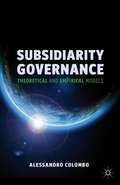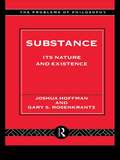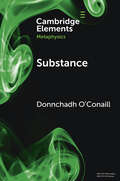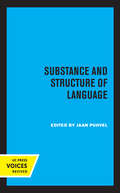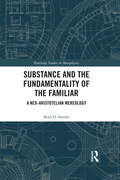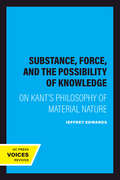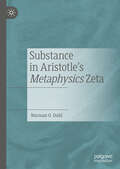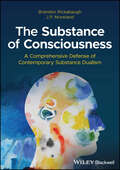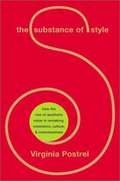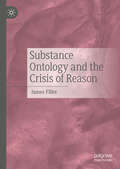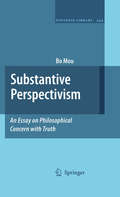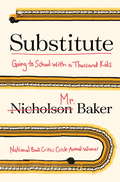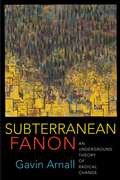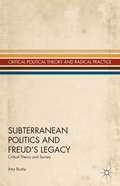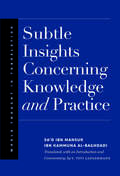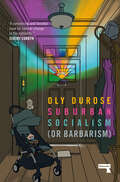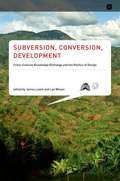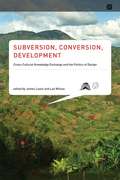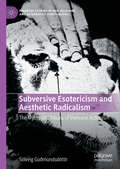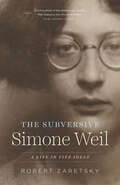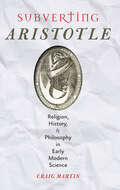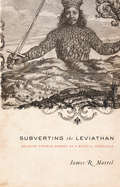- Table View
- List View
Subsidiarity Governance
by Alessandro ColomboThis volume summarizes the key elements and main features of a subsidiarity-informed model of governance and outlines an analytical framework which can be applied to other subsidiarity-informed models of governance worldwide.
Substance: Its Nature and Existence (Problems of Philosophy)
by Joshua Hoffman Gary RosenkrantzSubstance has been a leading idea in the history of Western philosophy. Joshua Hoffman and Gary S. Rosenkrantz explain the nature and existence of individual substances, including both living things and inanimate objects. Specifically written for students new to this important and often complex subject, Substance provides both the historical and contemporary overview of the debate.Great Philosophers of the past, such as Aristotle, Descartes, Spinoza, Leibnitz, Locke, and Berkeley were profoundly interested in the concept of substance. And, the authors argue, a belief in the existence of substances is an integral part of our everyday world view. But what constitutes substance? Was Aristotle right to suggest that artefacts like tables and ships don't really exist?Substance: Its Nature and Existence is one of the first non-technical, accessible guides to this central problem and will be of great use to students of metaphysics and philosophy.
Substance (Elements in Metaphysics)
by Donnchadh O'ConaillSubstance has long been one of the key categories in metaphysics. This Element focuses on contemporary work on substance, and in particular on contemporary substance ontologies, metaphysical systems in which substance is one of the fundamental categories and individual substances are among the basic building blocks of reality. The topics discussed include the different metaphysical roles which substances have been tasked with playing; different critieria of substancehood (accounts of what is it to be a substance); arguments for and against the existence of substances; and different accounts of which entities, if any, count as substances.
Substance and Structure of Language
by Jaan PuhvelThis title is part of UC Press's Voices Revived program, which commemorates University of California Press’s mission to seek out and cultivate the brightest minds and give them voice, reach, and impact. Drawing on a backlist dating to 1893, Voices Revived makes high-quality, peer-reviewed scholarship accessible once again using print-on-demand technology. This title was originally published in 1969.
Substance and the Fundamentality of the Familiar: A Neo-Aristotelian Mereology (Routledge Studies in Metaphysics)
by Ross InmanSubstance and the Fundamentality of the Familiar explicates and defends a novel neo-Aristotelian account of the structure of material objects. While there have been numerous treatments of properties, laws, causation, and modality in the neo-Aristotelian metaphysics literature, this book is one of the first full-length treatments of wholes and their parts. Another aim of the book is to further develop the newly revived area concerning the question of fundamental mereology, the question of whether wholes are metaphysically prior to their parts or vice versa. Inman develops a fundamental mereology with a grounding-based conception of the structure and unity of substances at its core, what he calls substantial priority, one that distinctively allows for the fundamentality of ordinary, medium-sized composite objects. He offers both empirical and philosophical considerations against the view that the parts of every composite object are metaphysically prior, in particular the view that ascribes ontological pride of place to the smallest microphysical parts of composite objects, which currently dominates debates in metaphysics, philosophy of science, and philosophy of mind. Ultimately, he demonstrates that substantial priority is well-motivated in virtue of its offering a unified solution to a host of metaphysical problems involving material objects.
Substance, Force, and the Possibility of Knowledge: On Kant's Philosophy of Material Nature
by Jeffrey EdwardsA new understanding of Kant’s theory of a priori knowledge and his natural philosophy emerges from Jeffrey Edwards’s mature and penetrating study. In the Third Analogy of Experience, Kant argues for the existence of a dynamical plenum in space. This argument against empty space demonstrates that the dynamical plenum furnishes an a priori necessary condition for our experience and knowledge of an objective world.Such an a priori existence proof, however, transgresses the limits Kant otherwise places on transcendental arguments in the Critique of Pure Reason because it establishes a material transcendental condition of possible experience. This finding motivates Edwards to examine the broader context of Kant’s views about matter, substance, causal influence, and physical aether in connection with the developmental history of his theory of transcendental idealism. Against the backdrop of early modern metaphysics and contemporaneous physical theory, Edwards explicates the origins of the Third Analogy in Kant’s early work on the metaphysics of nature.The argument against empty space presented in the Third Analogy reveals a central aspect of Kant’s transcendental theory of experience that Edwards explains lucidly. By clarifying the epistemological standpoint at issue in the Third Analogy, he shows that the fundamental revisions to which Kant subjects his theory of knowledge in the Opus postumum not only originate in his precritical metaphysics of nature but are developments of an argument central to the Critique of Pure Reason itself. Edwards’s work is important to scholars working in the history of philosophy and the history and philosophy of science, as well as to Kant specialists.
Substance in Aristotle's Metaphysics Zeta
by Norman O. DahlThis book argues that according to Metaphysics Zeta, substantial forms constitute substantial being in the sensible world, and individual composites make up the basic constituents that possess this kind of being. The study explains why Aristotle provides a reexamination of substance after the Categories, Physics, and De Anima, and highlights the contribution Z is meant to make to the science of being. Norman O. Dahl argues that Z.1-11 leaves both substantial forms and individual composites as candidates for basic constituents, with Z.12 being something that can be set aside. He explains that although the main focus of Z.13-16 is to argue against a Platonic view that takes universals to be basic constituents, some of its arguments commit Aristotle to individual composites as basic constituents, with Z.17’s taking substantial form to constitute substantial being is compatible with that commitment. .
The Substance of Consciousness: A Comprehensive Defense of Contemporary Substance Dualism
by Brandon Rickabaugh J. P. MorelandA singularly powerful and rigorous argument in favor of modern substance dualism In The Substance of Consciousness: A Comprehensive Defense of Contemporary Substance Dualism, two distinguished philosophers deliver a unique and powerful defense of contemporary substance dualism, which makes the claim that the human person is an embodied fundamental, immaterial, and unifying substance. Multidisciplinary in scope, the book explores areas of philosophy, cognitive science, neuroscience, and the sociology of mind-body beliefs. The authors present the most comprehensive, up-to-date, and rigorous non-edited work on substance dualism in the field, as well as a detailed history of how property and substance dualism have been presented and evaluated over the last 150 years. Alongside developing new and updated positive arguments for substance dualism, they also discuss key metaphysical notions and distinctions that inform the examination of substance dualism and its alternatives. Readers will also find: A thorough examination of the recent shift away from standard physicalism and the renaissance of substance dualism Comprehensive explorations of the likely future of substance dualism in the twenty-first century, including an exhaustive list of proposed research projects for substance dualists Practical discussion of new and rigorous critiques of significant physicality alternatives, including emergentism and panpsychism. Extensive treatments of philosophy of mind debates about the roles played by staunch/faint-hearted naturalism and theism in establishing or presuming methodology, epistemic priorities, and prior metaphysical commitments Perfect for professional philosophers, The Substance of Consciousness will also earn a place in the libraries of consciousness researchers, philosophical theologians, and religious studies scholars.
The Substance of Style: How the Rise of Aesthetic Value Is Remaking Commerce, Culture, and Consciousness
by Virginia PostrelWith thorough scholarship, this highly acclaimed editor and journalist argues that aesthetic appreciation of the sleek and colorful surfaces of commercial goods and activities has value and legitimacy in spite of the disparagement of austere critics who demand that form follow function.
Substance Ontology and the Crisis of Reason
by James FillerIn this book, James Filler traces the history of Being, understood as substance, from Parmenides through the Scholastics and ending with Descartes, in whom this understanding reaches a crisis. He further shows how this understanding inherently leads to serious ontological problems which are unresolvable within a substance ontological approach. It is this substance understanding which has dominated, but this view--with its emphasis on distinctness, independence, and separateness--will create insurmountable problems which ultimately lead to a crisis of thought after Descartes. The book examines this substance understanding, how it has historically shaped the understanding of Being, and how this understanding ultimately becomes ontologically and epistemologically destructive.
Substantive Perspectivism: An Essay on Philosophical Concern with Truth
by Bo MouThis book is an inquiry into the philosophical concern with truth as one joint subject in philosophy of language and metaphysics and presents a theory of truth, substantive perspectivism (SP). Emphasizing our basic pre-theoretic understanding of truth (i.e., what is captured by the axiomatic thesis of truth that the nature of truth consists in capturing the way things are), and in the deflationism vs. substantivism debate background, SP argues for the substantive nature of non-linguistic truth and its notion's indispensable substantive explanatory role, both of which are not only intrinsically beyond what the linguistic function of the truth predicate can tell but are fundamentally related to the raison d'être of the truth predicate. Taking a holistic approach, SP endeavors to do justice to various reasonable perspectives, which are somehow contained in many competing accounts of truth, through a coordinate system: SP interprets such perspectives as distinct but related perspective-elaboration principles that distinctively (regarding distinct dimensions of the truth concern and/or for the sake of distinct purposes) elaborate, but are also unified by, the truth axiom thesis. To look at the issue from a broader vision, the book also takes a cross-tradition approach exploring the relationship between Daoist thinking of truth and thinking about truth in analytic philosophy. This book will enhance our systematic understanding of the issue through its holistic approach, broaden our vision on the issue via its cross-tradition approach, and enrich the conceptual and explanatory resources in treating the issue.
Substitute: Going to School With a Thousand Kids
by Nicholson Baker"May be the most revealing depiction of the American contemporary classroom that we have to date." --Garret Keizer, The New York Times Book Review Bestselling author Nicholson Baker, in pursuit of the realities of American public education, signed up as a substitute teacher in a Maine public school district.In 2014, after a brief orientation course and a few fingerprinting sessions, Nicholson Baker became an on-call substitute teacher in a Maine public school district. He awoke to the dispatcher's five-forty a.m. phone call and headed to one of several nearby schools; when he got there, he did his best to follow lesson plans and help his students get something done. What emerges from Baker's experience is a complex, often touching deconstruction of public schooling in America: children swamped with overdue assignments, overwhelmed by the marvels and distractions of social media and educational technology, and staff who weary themselves trying to teach in step with an often outmoded or overly ambitious standard curriculum. In Baker's hands, the inner life of the classroom is examined anew--mundane worksheets, recess time-outs, surprise nosebleeds, rebellions, griefs, jealousies, minor triumphs, kindergarten show-and-tell, daily lessons on everything from geology to metal tech to the Holocaust--as he and his pupils struggle to find ways to get through the day. Baker is one of the most inventive and remarkable writers of our time, and Substitute, filled with humor, honesty, and empathy, may be his most impressive work of nonfiction yet.From the Hardcover edition.
Substitute: Going to School With a Thousand Kids
by Nicholson Baker**A New York Times Bestseller**"May be the most revealing depiction of the American contemporary classroom that we have to date." --Garret Keizer, The New York Times Book Review Bestselling author Nicholson Baker, in pursuit of the realities of American public education, signed up as a substitute teacher in a Maine public school district.In 2014, after a brief orientation course and a few fingerprinting sessions, Nicholson Baker became an on-call substitute teacher in a Maine public school district. He awoke to the dispatcher's five-forty a.m. phone call and headed to one of several nearby schools; when he got there, he did his best to follow lesson plans and help his students get something done. What emerges from Baker's experience is a complex, often touching deconstruction of public schooling in America: children swamped with overdue assignments, overwhelmed by the marvels and distractions of social media and educational technology, and staff who weary themselves trying to teach in step with an often outmoded or overly ambitious standard curriculum. In Baker's hands, the inner life of the classroom is examined anew--mundane worksheets, recess time-outs, surprise nosebleeds, rebellions, griefs, jealousies, minor triumphs, kindergarten show-and-tell, daily lessons on everything from geology to metal tech to the Holocaust--as he and his pupils struggle to find ways to get through the day. Baker is one of the most inventive and remarkable writers of our time, and Substitute, filled with humor, honesty, and empathy, may be his most impressive work of nonfiction yet.From the Hardcover edition.
Subterranean Fanon: An Underground Theory of Radical Change
by Gavin ArnallThe problem of change recurs across Frantz Fanon’s writings. As a philosopher, psychiatrist, and revolutionary, Fanon was deeply committed to theorizing and instigating change in all of its facets. Change is the thread that ties together his critical dialogue with Hegel, Marx, Freud, and Nietzsche and his intellectual exchange with Césaire, Kojève, and Sartre. It informs his analysis of racism and colonialism, négritude and the veil, language and culture, disalienation and decolonization, and it underpins his reflections on Martinique, Algeria, the Caribbean, Africa, the Third World, and the world at large.Gavin Arnall traces an internal division throughout Fanon’s work between two distinct modes of thinking about change. He contends that there are two Fanons: a dominant Fanon who conceives of change as a dialectical process of becoming and a subterranean Fanon who experiments with an even more explosive underground theory of transformation. Arnall offers close readings of Fanon’s entire oeuvre, from canonical works like Black Skin, White Masks and The Wretched of the Earth to his psychiatric papers and recently published materials, including his play, Parallel Hands. Speaking both to scholars and to the continued vitality of Fanon’s ideas among today’s social movements, this book offers a rigorous and profoundly original engagement with Fanon that affirms his importance in the effort to bring about radical change.
Subterranean Politics and Freud’s Legacy
by Amy BuzbySubterranean Politics and Freud's Legacy seeks to reestablish psychoanalysis as an ally to critical theory's efforts to restore subjectivity and oppose systemic domination in modernity. Given critical theory's ongoing crisis of identity and purpose, this project makes a significant contribution to contemporary political theory.
Subtle Insights Concerning Knowledge and Practice (World Thought in Translation)
by Sa‘d Ibn Kammuna al-BaghdadiSurprisingly modern essays on the unity of all monotheistic regimens by a medieval philosopher Written in the mid‑thirteenth century for the newly appointed governor of Isfahan, this compact treatise and philosophical guidebook includes a wide‑ranging and accessible set of essays on ethics, psychology, political philosophy, and the unity of God. Ibn Kammūna,a Jewish scholar writing in Baghdad during a time of Mongol occupation, was a controversial figure whose writings sometimes incited riots. He argued, among other things, the commonality of all monotheisms, both prophetic and philosophical. Here, for the first time in English, is a surprisingly modern work on the unity of all monotheistic regimes from a key medieval philosopher.
Suburban Socialism: (Or Barbarism)
by Oly DuroseReflecting on his own landslide loss in conservative suburbia, Oly Durose asks how we can transform the urban outskirts of the status quo into centres of transformative change.In December 2019, Oly Durose lost by over 25,000 votes as the Labour Party Parliamentary Candidate for Brentwood & Ongar. Revealing what it&’s like to stand on a socialist platform in one of the safest Conservative seats in the UK, this book makes the case for socialism in the suburbs, unveils the challenges of its electoral realisation, and proposes a strategic revolution required to win.Suburban Socialism asks what it would be like to bring white picket fences under collective control instead. To convince suburbanites of this radical alternative inside the electoral arena, this book argues that we must revolutionise our strategy outside of it. From the aftermath of the Industrial Revolution to the shockwaves of the metropolitan youthquake, socialism has predominantly been framed as an urban struggle. Identifying the possibilities for suburban resistance, this book offers a more geographically inclusive invitation to the socialist struggle, revealing why the suburban struggle is global in scale. Turning a suburb that shares from a hopeless fantasy into an electoral reality, Suburban Socialism illustrates why the path to socialism around the world is through the heterogenous suburban terrain.
Subversion, Conversion, Development
by James Leach Lee WilsonThis book explores alternative cultural encounters with and around information technologies. These encounters are alternative because they counter dominant, Western-oriented notions of media consumption; they include media practices as forms of cultural resistance and subversion, "DIY cultures," and other nonmainstream models of technology production. The contributors -- leading thinkers in science and technology studies, anthropology, and software design -- pay special attention to the specific inflections that different cultures and communities give to the value of knowledge. The richly detailed accounts presented here challenge the dominant view of knowledge as a neutral good -- information available for representation and encoding but separated from all social relations. The chapters examine specific cases in which the forms of knowledge and cross-cultural encounters are shaping technology use and development. They consider design, use, and reuse of technological tools, including databases, GPS devices, books, and computers, in locations that range from Australia and New Guinea to Germany and the United States. ContributorsPoline Bala, Alan Blackwell, Wade Chambers, Michael Christie, Hildegard Diemberger, Stephen Hugh-Jones, James Leach, Jerome Lewis, Dawn Nafus, Gregers Petersen, Marilyn Strathern, David Turnbull, Helen Verran, Laura Watts, Lee Wilson
Subversion, Conversion, Development
by Lee Wilson James LeachThis book explores alternative cultural encounters with and around information technologies. These encounters are alternative because they counter dominant, Western-oriented notions of media consumption; they include media practices as forms of cultural resistance and subversion, "DIY cultures," and other nonmainstream models of technology production. The contributors -- leading thinkers in science and technology studies, anthropology, and software design -- pay special attention to the specific inflections that different cultures and communities give to the value of knowledge. The richly detailed accounts presented here challenge the dominant view of knowledge as a neutral good -- information available for representation and encoding but separated from all social relations. The chapters examine specific cases in which the forms of knowledge and cross-cultural encounters are shaping technology use and development. They consider design, use, and reuse of technological tools, including databases, GPS devices, books, and computers, in locations that range from Australia and New Guinea to Germany and the United States. ContributorsPoline Bala, Alan Blackwell, Wade Chambers, Michael Christie, Hildegard Diemberger, Stephen Hugh-Jones, James Leach, Jerome Lewis, Dawn Nafus, Gregers Petersen, Marilyn Strathern, David Turnbull, Helen Verran, Laura Watts, Lee Wilson
Subversive Esotericism and Aesthetic Radicalism: The Myths and Rituals of Viennese Actionism (Palgrave Studies in New Religions and Alternative Spiritualities)
by Sólveig GuðmundsdóttirIn this book, Sólveig Guðmundsdóttir uncovers the crucial role of esotericism in the art of the Vienna Actionists—a group of Austrian neo-avant-garde artists, infamous for their transgressive performance art. Addressing this frequently overlooked aspect of Actionism, Guðmundsdóttir traces, historicizes, and examines the esoteric discourses in selected works: the collective manifesto Die Blutorgel (1962), Rudolf Schwarzkogler’s text Das Ästhetische Panorama (1967/68) and the performances Abreaktionsspiel (1970) by Hermann Nitsch, and Zerreißprobe (1970) by Günter Brus. Mapping out the various discursive entanglements as they appear in the works, i.e. between esotericism and psychoanalysis, fascism, gender, sexuality, aesthetics, science, orientalism and religious discourses, the author illustrates and establishes the importance of esoteric traditions for the Actionists’ art and subversive practices. The historical analysis of the artworks reflects on the cultural nexus of post-war Austria, as well as the relations between radical politics, countercultures and esotericism, and how they appear in Actionism. Guðmundsdóttir argues that to survey the historical placement of esotericism is vital for understanding not only the context of their works, but also the contradictory image of the Actionists as both anti-authoritarian and reactionary artists.
Subversive Itinerary
by Peter Kulchyski Shannon BellSubversive Itinerary investigates the theoretical evolution of the influential political theorist Gad Horowitz, as well as the historical impact of his ideas on Canadian life and letters. Bringing together dynamic new works by both established and emerging scholars, along with three new articles by Horowitz himself, this volume examines the concepts he developed and extends his approach beyond the current historical moment.The book includes a history of Horowitz's engagements as a public intellectual through appraisals of his early, mid, and late-career contributions, from the sixties to the present day. Along the way, the contributors present innovative new work in Canadian political thought, continental theory, Jewish philosophy, Buddhism, and radical general semantics. Subversive Itinerary demonstrates how Horowitz's itinerary delivers invaluable tools for understanding issues of critical importance today.
The Subversive Simone Weil: A Life in Five Ideas
by Robert ZaretskyKnown as the “patron saint of all outsiders,” Simone Weil (1909–43) was one of the twentieth century’s most remarkable thinkers, a philosopher who truly lived by her political and ethical ideals. In a short life framed by the two world wars, Weil taught philosophy to lycée students and organized union workers, fought alongside anarchists during the Spanish Civil War and labored alongside workers on assembly lines, joined the Free French movement in London and died in despair because she was not sent to France to help the Resistance. Though Weil published little during her life, after her death, thanks largely to the efforts of Albert Camus, hundreds of pages of her manuscripts were published to critical and popular acclaim. While many seekers have been attracted to Weil’s religious thought, Robert Zaretsky gives us a different Weil, exploring her insights into politics and ethics, and showing us a new side of Weil that balances her contradictions—the rigorous rationalist who also had her own brand of Catholic mysticism; the revolutionary with a soft spot for anarchism yet who believed in the hierarchy of labor; and the humanitarian who emphasized human needs and obligations over human rights. Reflecting on the relationship between thought and action in Weil’s life, The Subversive Simone Weil honors the complexity of Weil’s thought and speaks to why it matters and continues to fascinate readers today.
Subverting Aristotle: Religion, History, and Philosophy in Early Modern Science
by Craig MartinHow new thinking about history, evidence, and scientific authority depended on undermining the authority of Aristotelianism."The belief that Aristotle’s philosophy is incompatible with Christianity is hardly controversial today," writes Craig Martin. Yet "for centuries, Christian culture embraced Aristotelian thought as its own, reconciling his philosophy with theology and church doctrine. The image of Aristotle as source of religious truth withered in the seventeenth century, the same century in which he ceased being an authority for natural philosophy." In this fresh study of the complicated origins of revolutionary science in the age of Bacon, Hobbes, and Boyle, Martin traces one of the most important developments in Western European history: the rise and fall of Aristotelianism from the eleventh to the eighteenth century.Medieval theologians reconciled Aristotelian natural philosophy with Christian dogma in a synthesis that dominated religious thought for centuries. This synthesis unraveled in the seventeenth century contemporaneously with the emergence of the new natural philosophies of the scientific revolution. Important figures of seventeenth-century thought strove to show that the medieval appropriation of Aristotle defied the historical record that pointed to an impious figure of dubious morality. While numerous scholars have written on the seventeenth-century downfall of Aristotelianism, almost all of those works have examined how the conceptual content of the new sciences—such as the heliocentric cosmology, atomism, mechanical and mathematical models, and experimentalism—were used to dismiss the views of Aristotle. Subverting Aristotle is the first to focus on the religious polemics accompanying the scientific controversies that led to the eventual demise of Aristotelian natural philosophy.Martin’s thesis draws extensively on primary source material from England, France, Italy, Germany, and the Netherlands. It alters present perceptions not only of the scientific revolution but also of the role of Renaissance humanism in the forging of modernity.
Subverting the Leviathan: Reading Thomas Hobbes as a Radical Democrat
by James MartelIn Leviathan, Thomas Hobbes's landmark work on political philosophy, James Martel argues that although Hobbes pays lip service to the superior interpretive authority of the sovereign, he consistently subverts this authority throughout the book by returning it to the reader. Martel demonstrates that Hobbes's radical method of reading not only undermines his own authority in the text, but, by extension, the authority of the sovereign as well. To make his point, Martel looks closely at Hobbes's understanding of religious and rhetorical representation. In Leviathan, idolatry is not just a matter of worshipping images but also a consequence of bad reading. Hobbes speaks of the "error of separated essences," in which a sign takes precedence over the idea or object it represents, and warns that when the sign is given such agency, it becomes a disembodied fantasy leading to a "kingdom of darkness." To combat such idolatry, Hobbes offers a method of reading in which one resists the rhetorical manipulation of figures and tropes and recognizes the codes and structures of language for what they are-the only way to convey a fundamental inability to ever know "the thing itself." Making the leap to politics, Martel suggests that following Hobbes's argument, the sovereign can also be seen as idolatrous-a separated essence-a figure who supplants the people it purportedly represents, and that learning to be better readers enables us to challenge, if not defeat, the authority of the sovereign.
Success and Suppression
by Dag Nikolaus HasseDag Nikolaus Hasse shows how ideological and scientific motives led to the decline of Arabic traditions in European culture. The Renaissance was a turning point: on the one hand, Arabic scientific traditions reached their peak of influence in Europe; on the other, during this period the West began to forget, or suppress, its debt to Arabic culture.
